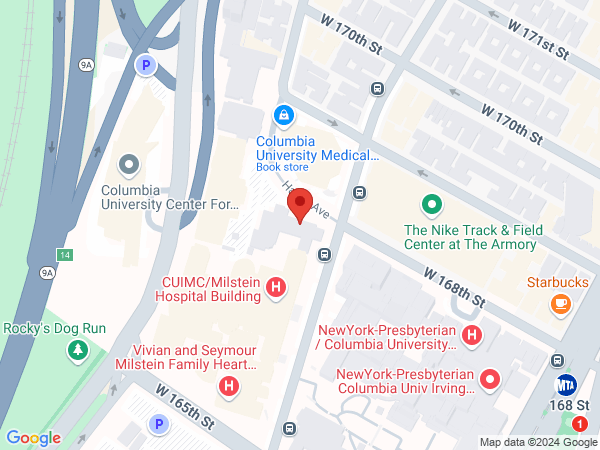
Overview
Scott A. Small M.D. is the Director of the Alzheimer’s Disease Research Center at Columbia University, where he is the Boris and Rose Katz Professor of Neurology. He is appointed in the Departments of Neurology, Radiology, and Psychiatry.
With an expertise in Alzheimer’s disease and cognitive aging, Dr. Small’s research focuses on the hippocampus, a circuit in the brain targeted by these and other disorders, notably schizophrenia. He has pioneered the development and application of high-resolution functional MRI techniques that can pinpoint parts of the hippocampus most affected by aging and disease. His lab then uses this information to try to identify causes of these disorders. Over the years, his lab has used this ‘top-down’ approach to isolate pathogenic mechanisms related to Alzheimer’s disease, cognitive aging, and schizophrenia. More recently, his lab has used this insight for drug discovery and to develop novel therapeutic interventions, some of which are currently being tested in patients.
Dr. Small has co-authored over 120 articles and his neuroimaging and molecular work has led to 7 patents. Dr. Small is the recipient of numerous awards, including the Beeson Scholar Award in Aging Research from the American Federation on Aging, the McKnight Neuroscience of Brain Disorders Award, the Derek Denny-Brown Young Neurological Scholar Award from the American Neurological Association, and the Lamport Award for Excellence in Clinical Science Research from Columbia University.
Areas of Expertise / Conditions Treated
- Dementia
- Memory Impairment
Academic Appointments
- Boris and Rose Katz Professor of Neurology (in the Taub Institute for Research on Alzheimer's Disease and the Aging Brain, the Gertrude H. Sergievsky Center and in Radiology)
Administrative Titles
- Director, Alzheimer's Disease Research Center
Hospital Affiliations
- NewYork-Presbyterian / Columbia University Irving Medical Center
Gender
- Male
Schedule an Appointment
Connect Patient Portal
For existing patients, login to make an appointment, view documentation or contact your care provider.
Location(s)
Insurance Accepted
Aetna
- Aetna Signature Administrators
- EPO
- HMO
- Medicare Managed Care
- NY Signature
- POS
- PPO
- Student Health
Affinity Health Plan
- Essential Plan
- Medicaid Managed Care
Amida Care
- Special Needs
Cigna
- EPO
- Great West (National)
- HMO
- Medicare Managed Care
- POS
- PPO
Elderplan
- Medicare Managed Care
Emblem/GHI
- Medicare Managed Care
- PPO
Emblem/HIP
- ConnectiCare
- EPO
- Essential Plan
- HMO
- Medicaid Managed Care
- Medicare Managed Care
- POS
- PPO
- Select Care (Exchange)
- Vytra
Empire Blue Cross/Blue Shield
- EPO
- HMO
- Medicare Managed Care
- PPO
Empire Blue Cross Blue Shield HealthPlus
- Child/Family Health Plus
- Essential Plan
- Medicaid Managed Care
Fidelis Care
- Child/Family Health Plus
- Essential Plan
- Medicaid Managed Care
- Medicare Managed Care
Healthfirst
- Child/Family Health Plus
- Leaf (Exchange)
- Medicaid Managed Care
- Medicare Managed Care
Local 1199
- Local 1199
- NYP Employee Plan
MagnaCare (National)
- MagnaCare
Medicare
- Railroad
- Traditional Medicare
Multiplan
- Multiplan
MVP Health Care
- Child/Family Health Plus
- Essential Plan
- HMO
- Medicaid Managed Care
RiverSpring
- Special Needs
UnitedHealthcare
- Compass (Exchange)
- Empire Plan
- HMO
- Medicaid (Community Plan)
- Medicare Managed Care
- Oxford Freedom
- Oxford HMO
- Oxford Liberty
- POS
- PPO
VNSNY CHOICE
- Medicare Managed Care
- SelectHealth
- Special Needs
WellCare
- Medicaid Managed Care
- Medicare Managed Care
World Trade Center Health Plan
- World Trade Center Health Plan
Credentials & Experience
Education & Training
- Columbia University College of Physicians and Surgeons
- Residency: NewYork-Presbyterian Hospital/Columbia University Medical Center
- Fellowship: NewYork-Presbyterian Hospital/Columbia University Medical Center
Board Certifications
- Internal Medicine
Honors & Awards
- Irving Center Scholar Award
- AFAR Paul Beeson Physician Faculty Scholar in Aging Research Award: Functional analysis of the hippocampal formation in age-related memory decline
- NIH Mentored Patient-Oriented Research Career Development Award: Longitudinal Analysis of Age Related Memory Decline
- NIH Alzheimer's Disease Research Center Award (senior investigator): fMRI analysis of hippocampal regions in aging and Alzheimer's disease
Research
The hippocampal formation functions as a three-dimensional network. We have been developing MRI approaches that allow us to investigate the hippocampus as a circuit in humans and, most recently, in mice to understand how the hippocampus functions during normal associative memory, and how the hippocampus fails during aging and Alzheimer's disease.
We have focused on the longitudinal axis of the hippocampus in our studies of normal memory where we have human subjects process auditory and visual stimuli, in isolation or paired in time. Results from these studies suggest specific circuit mechanisms for how the hippocampus encodes and combines information during associative memory. We are currently extending this area of investigation into mice, which will allow us to uncover potential cellular and molecular mechanisms that underlie these circuit mechanisms. We have focused on the transverse axis of the hippocampal formation in our efforts to understand how the hippocampus fails in aging and Alzheimer's disease. Toward this goal, we have developed novel imaging approaches that measure hippocampal function with microscopic resolution.
These approaches allow us to assess the multiple hippocampal subregions that make up the transverse circuit—individually to pinpoint the site of dysfunction, and simultaneously to correct for circuit-wide effects. We have used this approach to generate patterns of hippocampal dysfunction in humans with Alzheimer's disease and normal aging, as well as in mouse models with Alzheimer's disease and normal aging. Taken together, the results suggest that MRI maps of hippocampal dysfunction can dissociate causes of memory decline. We are currently testing whether these MRI approaches can be used as a diagnostic tool for early Alzheimer's disease, and whether these MRI approaches can be exploited for drug development.
Research Interests
- Brain Imaging
- Neural Degeneration and Repair
- Neurobiology of Disease
- Neurobiology of Learning and Memory
Selected Publications
- Small, S.A. (2002). The longitudinal axis of the hippocampal formation: Its anatomy, circuitry and role in cognitive function. Rev. Neurosci., 13: 183-194
- Small, S.A., Tsai, W.Y., DeLaPaz, R., Mayeux, R., Stern, Y. (2002). Imaging hippocampal function across the human life span: Is memory decline normal or not? Ann. Neurol., 51: 290-295.
- Small, S.A., Nava, A.S., Tsai, W.Y., DeLaPaz, R., Mayeux, R., Stern, Y. (2001). Circuit mechanisms underlying memory encoding and retrieval in the long axis of the hippocampal formation. Nature Neuro., 442-449.
- Small, S.A., Wu, E.X., Bartsch, D., Perera, G.M., Lacefield, C.O., DeLaPaz, R., Mayeux, R., Stern, Y., and Kandel, E.R. (2000). Imaging physiologic dysfunction of individual hippocampal subregions in humans and genetically modified mice. Neuron, 28: 653-664.
- Small, S.A., Perera, G.M., DeLaPaz, R., Mayeux, R., and Stern, Y. (1999). Differential regional dysfunction of the hippocampal formation among elderly with memory decline and Alzheimer's disease. Ann. Neurol., 45: 466-472.
For a complete list of publications, please visit PubMed.gov
